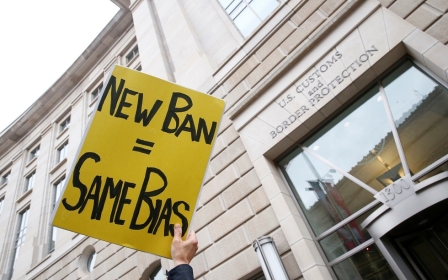US federal judge in Hawaii freezes Trump's revised travel ban

A US federal judge in Hawaii dealt another legal blow to President Donald Trump on Wednesday, issuing an emergency halt to his revised travel ban just hours before it was set to go into effect early on Thursday.
US district judge Derrick Watson put out an emergency stop on Trump's executive order, which aimed to temporarily bar entry to the United States of most refugees as well as travellers from six Muslim-majority countries.
Watson said the state of Hawaii showed a strong likelihood of success in its claims that the order violates the establishment clause of the US Constitution, which prevents religious discrimination. Critics of the ban argued it was discriminatory against Muslims.
The federal judges at three hearings on Wednesday strongly questioned lawyers for both the administration and its critics, pressing on the question of who specifically would be harmed by the revamped executive order.
But the ruling means a nationwide freeze on enforcement of section two of the order, banning entry by nationals of Iran, Libya, Somalia, Sudan, Syria and Yemen for 90 days.
It also halts section six, suspending the US refugee admissions programme for 120 days.
"The court declines to stay this ruling or hold it in abeyance should an emergency appeal of this order be filed," the ruling said.
The Republican president has said the policy is critical for national security.
Trump said the decision was an example of "unprecedented judicial overreach," and vowed to fight the "flawed" ruling all the way to the Supreme Court if required.
"This is in the opinion of many an unprecedented judicial overreach," Trump told a rally in Nashville, Tennessee.
"The law in the constitution gave the president the power to suspend immigration when he deems it to be in the national interest of our country," he said, adding: "We are going to win."
“This ruling makes us look weak, which by the way we no longer are. We’re going to fight this terrible ruling," he added.
Watson's ruling marks the second defeat for the administration's travel ban. Last month, a federal court in Seattle froze the first rendition of Trump's travel ban, and was upheld by the Ninth Circuit Court of Appeals in San Francisco. Trump responded angrily to the first freeze, tweeting "we will see you in court" in all caps on Twitter.
Following the suspension of the second ban, reactions swiftly poured in.
"A temporary Restraining Order granted nationwide against the #MuslimBan 2.0 in Hawaii proves we are a nation of laws, not of men," Nihad Awad, executive director of the Council on American Islamic Relations, said in a tweet.
Washington Attorney General Bob Ferguson said “Great news" after the Hawaii ruling.
Paul Ryan, the Republican Speaker of the US House of Representatives, said the ban was needed to improve vetting of people entering the United States in order to prevent attacks and said he had no doubt that it would be upheld by higher courts.
The court in Honolulu was the first to rule on a trio of legal challenges against the ban, which targets all refugees and people from six mainly Muslim countries.
A judge in Maryland said he also might issue an emergency order on Wednesday in advance of the ban.
State attorneys general and refugee resettlement agencies across the US have filed several lawsuits asking courts to issue emergency stays on Trump’s executive order.
The revised executive order was signed on 6 March, after an initial, broader ban was suspended by federal courts.
It was to temporarily bar entry to the US of most refugees as well as travellers from six Muslim-majority countries. The Republican president has said the policy is critical for national security.
Trump signed the initial order a week after his 20 January inauguration. It temporarily banned travellers from seven mostly Muslim countries in addition to most refugees and took effect immediately, causing chaos and protests at airports across the country and around the globe.
Stay informed with MEE's newsletters
Sign up to get the latest alerts, insights and analysis, starting with Turkey Unpacked
Middle East Eye delivers independent and unrivalled coverage and analysis of the Middle East, North Africa and beyond. To learn more about republishing this content and the associated fees, please fill out this form. More about MEE can be found here.




